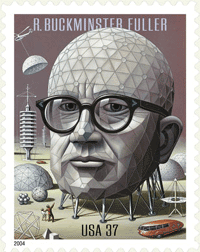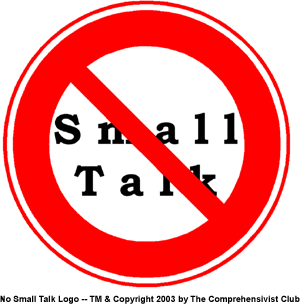


The Comprehensivist Club
"Man is designed to be a comprehensivist." -- Buckminster Fuller



Pictured above is the "No Small Talk" logo of the Comprehensivist club, flanked on either side by the Buckminster Fuller U. S. postage stamp unveiled at Stanford University.
The Comprehensivist Club meets in San Antonio, TX. Each meeting is dedicated to timeless topics worthy of deliberation and reflection. The goal of each meeting is to produce an enriching, high-yield experience that will increase our ability to synthesize knowledge from many different areas. Due to limited space, RSVP is required. To request an invitation, please send email to tennison@texaspsychiatry.net
Final Meeting: Saturday, March 25, 2006
Time: 7:00 to 10:00 pm
Topic: Global Warming: A Presentation by Al Gore
Come here and see Al Gore's excellent United Nations presentation on Global Warming. This is an extremely informative presentation. Moreover, Gore's ability to communicate reminds us of the inadequacy of the bumbling, inarticulate speech of George W. Bush. The sophistication of Gore's presentation stands in stark contrast to the simple-minded, dumbed-down speeches and talking points of George W. Bush. We should expect any United States President to be able to communicate as well as Gore, yet George W. Bush is probably the most inarticulate U. S. President since audio-visual recording became possible.
16th Meeting: Saturday, January 28th, 2006
Time: 7:00 to 10:00 pm
Topic: The End of Suburbia: Considering the Sustainability of American Oil Consumption
In light of supply and demand issues relating to oil, we will watch the excellent documentary, "The End of Suburbia." Given that the worldwide demand for oil affects our lives in numerous ways, this documentary should provide ample stimuli for some great discussions.
15th Meeting: Saturday, September 24th, 2005
Time: 7:00 to 10:00 pm
Topic: The Opposite of Due Process: Franz Kafka's "The Trial"
What is "Due Process?" Especially after 9/11, it is helpful to remember what is meant by "Due Process" and why Due Process is important. Yet, unquestioning acceptance of the Patriot Act suggests that many seem to be unappreciative of why Due Process evolved as a right in the first place. We will view the 1993 movie re-make of "The Trial," which is based on the novel by Franz Kafka. (Orson Welles made a black and white version of "The Trial" in 1963.) Although it has a multitude of metaphorical meanings, on the surface, "The Trial" is a story of a man who is arrested, tried, and punished without ever knowing the charge or who accused him. Both the 1963 and 1993 film versions of "The Trial" offer compelling cinematic nightmares of what it might feel like to be victim of a lack of due process.
14th Meeting: Saturday, June 25th, 2005
Time: 7:00 to 10:00 pm
Topic: What is Art?
Are there universal criteria for what should be considered art? Is some art objectively "better" than other art, or is preference in art strictly a matter of personal opinion? Does the context in which art occurs influence how it should be considered? Come share your thoughts on these timeless questions.
13th Meeting: Saturday, March 26, 2005
Time: 7:00 to 10:00 pm
Topic: The "Hard Problem" of Consciousness
The idea for the Comprehensivist Club was first born during a discussion of a journal article by David Chalmers at "Biga on the Banks" restaurant in San Antonio, TX. On the March 26th, 2005 meeting of the Comprehensivist Club, we will return to the ideas of David Chalmers, philosopher of mind. Chalmers is among the most articulate current-day philosophers of mind. Come learn what he means by the "hard problem" of consciousness.
12th Meeting: 2-Year Anniversary Meeting: Saturday, January 29, 2005
Time: 7:00 to 10:00 pm
Topic: Theories of Everything: String Theory, M Theory, & Parallel Universes
Do we live in one of an infinite number of parallel universes? Come share your thoughts on modern physicists' attempts at formulating a theory of everything.
Eleventh Meeting, Saturday, November 20, 2004
Time: 7:00 to 10:00 pm
Topic: An Introduction to Noam Chomsky
The New York Times Book Review has described Chomsky as "arguably the most important intellectual alive." Chomsky is a professor of linguistics at MIT and a long-time political activist. We will view the EXCELLENT documentary, "Manufacturing Consent." In this documentary, Chomsky discusses how propaganda is used to create the illusion of having adequate information to make informed choices. Through his revelations, Chomsky helps us develop what he calls "intellectual self defense," a useful skill when making pivotal choices, such as voting in presidential elections.
Tenth Meeting, September 25, 2004
When: Saturday, September 25, 2004-- from 7:00 to 10:00 pm
Topic: The Possibility of Continued Election Fraud in the United States
With evidence that electronic voting machines can be MORE susceptible to election fraud than paper ballots, what steps can citizens take to assure that their vote is counted? Come share your thoughts on this extremely important topic.
Ninth Meeting
When: Saturday, July 31, 2004 -- from 7:00 to 10:00 pm
Topic: Truth: The First Casualty of the Iraq War
We will view the documentary, "Uncovered: The Whole Truth about the Iraq War." This documentary is perhaps even better than Michael "Moore's Fahrenheit 9/11" in that it has less editorializing and lets U.S. government officials with MANY years of experience speak at length about their first-hand experiences in the middle east and in dealing face-to-face with Saddam Hussein.
Eighth Meeting
When: Saturday, May 22, 2004 -- from 7:00 to 10:00 pm
Topic: Affluenza: The "Disease" of Consumerism and Its Devastating Consequences
Despite the material wealth of the United States, many Americans seem unable to achieve lasting happiness, or what philosophers have sometimes called, "the good life." Come view this documentary about how some are intentionally living simpler and less materialistic lives, and who claim, through this approach, to have achieved greater happiness.
Seventh Meeting
When: Saturday, Mary 27, 2004 -- from 7:00 to 10:00 pm
Topic: The Pursuit of Happiness in an Age of Bureaucracy and "Terrorism": Terry Gilliam's "Brazil"
Terry Gilliam's visionary 1985 film remains an anthem for many of the X Generation who were coming of age when it was released in 1985. Easily one of the best films ever made, it is a hilarious black comedy addressing some of the most absurd and dehumanizing trends of our time. Its real-life production battle is suggestive of that occurring during the making of "Citizen Kane." In addition to its other themes, "Brazil" became all the more prophetic after 9/11 because of its delving into the question of who gets labeled a "terrorist."
Sixth Meeting
When: Saturday, January 31, 2004 -- from 7:00 to 10:00 pm
Topic: The Influence of Drug Companies on the FDA Approval Process
The influence of drug companies on the FDA's drug-approval process is well documented. Come discuss your ideas about how to address attempts by drug companies to manipulate the U. S. government and to mislead consumers about the effects of the drugs they manufacture.
Fifth Meeting
When: Saturday, October 25, 2003 -- from 7:00 to 10:00 pm
Topic: "Bowling for Columbine:" Manipulation of the Fearful to Produce a Divided and More Highly Consumptive Populace
Although Michael Moore's film does not give us any final answers, the film implicates the emotion of "fear" as underlying both gun violence and consumption in the United States. Come share your opinions about ideas in this popular documentary.
Fourth Meeting
When: Saturday, August 30, 2003 -- from 7:00 to 10:00 pm
Topic: Evolution and Natural Selection in Biological and Non-Biological Systems
We will view a program in which scholars discuss how both physical systems, such as DNA, and non-physical systems, such as ideas, reproduce according to natural selection.
Third Meeting
When: Saturday, June 28, 2003 -- from 7:00 to 10:00 pm
Topic: Words that Inspire: Timeless Poetry, Lyrics, and Prose
Attendees of tonight's meeting are invited to bring and share any written words that they believe to have universal meaning across space and time, regardless of one's background.
Second Meeting
When: Saturday, April 26, 2003 -- from 1:00 pm to 7:00 pm
Topic: The Psychology of "Citizen Kane," Orson Welles, and William Randolph Hearst
The story of the making of "Citizen Kane" is every bit as interesting as the movie itself. Come view both "Citizen Kane" and a documentary about Welles' making of the movie that has been called "the greatest movie of all time" by more critics than any other movie.
Inaugural Meeting
When:
Saturday, February 22, 2003 -- from 7:00 to 10:00 pm
Topic: Should Knowledge of the Probable Future of Our Planet Affect how We Choose to Live Today?
We will discuss the life cycle of planet earth and consider any implications that earth's eventual fate might have on how we live today.
For more information, send inquiries to tennison@texaspsychiatry.net.